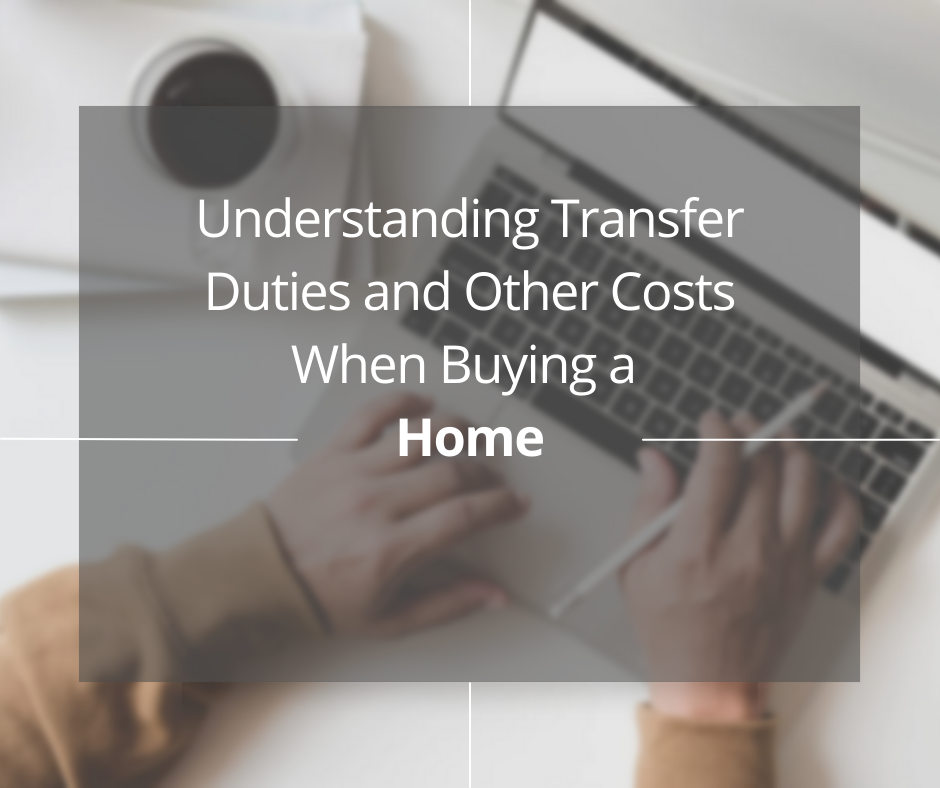Understanding Transfer Duties and Other Costs When Buying a Home
Buying a home is one of the most significant financial commitments you’ll ever make. While most homebuyers focus on securing the best possible home loan, it’s crucial to also consider the various additional costs associated with purchasing a property. Among these, transfer duties are often the most substantial and can come as a surprise if you’re not prepared. This article will guide you through transfer duties and other costs you need to account for when buying a home in South Africa.

What are Transfer Duties?
Transfer duties are a form of tax levied by the South African government on property transactions. When you buy a property, you’re required to pay transfer duties, which are calculated based on the purchase price of the property. These duties are payable to the South African Revenue Service (SARS) and must be settled before the property can be transferred into your name.
The transfer duty you pay increases as the property gets more expensive. However, properties under a certain value threshold are exempt from transfer duties, a policy aimed at making homeownership more accessible to first-time buyers.
Transfer Duty Rates for 2024
For the tax year ending 28 February 2024, the following rates apply:
Properties valued at R1,100,000 or less: No transfer duty is payable.
Properties valued between R1,100,001 and R1,512,500: 3% of the value above R1,100,000.
Properties valued between R1,512,501 and R2,117,500: R12,375 plus 6% of the value above R1,512,500.
Properties valued between R2,117,501 and R2,822,500: R44,625 plus 8% of the value above R2,117,500.
Properties valued between R2,822,501 and R11,300,000: R93,225 plus 11% of the value above R2,822,500.
Properties valued at R11,300,001 and above: R1,026,000 plus 13% of the value above R11,300,000.
These rates illustrate how the transfer duty increases with the value of the property. Therefore, it’s essential to factor this cost into your budget when considering purchasing a home.
Other Costs to Consider When Buying a Home
Aside from transfer duties, there are several other costs that buyers should be aware of:
Conveying Fees
The process of transferring property ownership requires the services of a conveyancer, a specialized attorney. Conveyancing fees depend on the property’s value and can be a major extra cost. These fees cover the preparation and registration of the documents required to transfer ownership.
Bond Registration Costs
If you’re taking out a home loan to purchase the property, you’ll need to pay bond registration fees. These fees are payable to the conveyancer who registers the bond with the Deeds Office. Like conveyancing fees, bond registration costs are also calculated on a sliding scale relative to the loan amount.
Deeds Office Fees
The Deeds Office charges a fee for registering the property in your name. This fee is generally lower than conveyancing and bond registration costs but is still an important consideration.
Rates and Taxes Clearance Certificate
Before a property can be transferred, the seller must obtain a rates and tax clearance certificate from the local municipality, indicating that all municipal accounts are up to date. The seller usually pays this cost, but it’s still an important part of the transfer process.
Homeowners’ Insurance
While not a direct cost of transfer, homeowners’ insurance is mandatory when taking out a bond. This insurance protects both the buyer and the lender in the event of damage to the property. It’s advisable to shop around for the best deal, as premiums can vary.
Valuation Fees
Your lender may require a property valuation to determine its market value before approving your bond.
An independent appraiser usually does the valuation, and the buyer typically pays the fee.
How to Prepare for These Costs
Understanding and preparing for these costs can save you from unexpected financial strain during the home-buying process. Here are some tips:
Budget Carefully: When planning your home purchase, include all these costs in your budget. Remember that they can add up to a significant amount.
Consult with Professionals: A bond originator can help you understand all the costs associated with buying a home, ensuring that you’re fully prepared.
Negotiate Where Possible: Some costs, like conveyancing fees, can be negotiated, especially if you’re using the same attorney for both the transfer and bond registration.
While transfer duties and other associated costs may seem daunting, being well-informed and financially prepared will make your home-buying experience smoother. Always factor in these costs early in your planning process to avoid any surprises. By understanding all the expenses involved, you can make more informed decisions and enjoy the exciting journey to homeownership.
